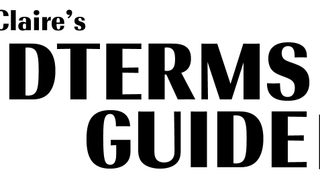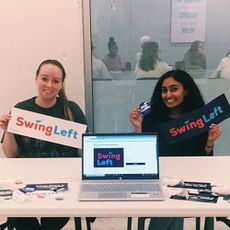
Election Day is a bit like a buffet.
Not just any kind of buffet, but the buffet your granddad drags you to after Sunday church because it's the only place that you and the 30-plus members of your family can all eat something. There are a ton of choices, and some choices are clearly worse than others. You're not sure which option will satisfy you and your basic needs, but you don't want to pick the option that will lead to a fiery hellscape in your digestive tract for, I don't know, two to six years. Some options are great for other people, but not for you, but you understand why people might like that choice–good for you, not for me.
But unlike a buffet, you have access to plenty of resources to help make this Election Day Buffet a little more palatable. Elections can get nasty, personal, and competitive, and that can be unattractive to people without a special interest in politics, or really to anyone who doesn't want to get into the drama of the moment. (I can't relate. I'm a messy gal who loves drama, but the closest I ever want to come to my own political scandal is Scandal.)

With the midterms looming—and the news cycle showing us that now, more than ever, voting is both necessary and important—choosing a candidate comes with a heavier weight than ever before.
Here's a handy-dandy guide to help you get informed, and make the pick you feel best represents you.
Decide What Matters To You
This is the most important thing in developing a political identity. What do you stand for? In the immortal words of the impeccable, immaculate Lin-Manuel Miranda, "If you stand for nothing, Burr, what will you fall for?"
Stand for something! Not having an opinion is boring, and frankly, anyone who says they don't care about politics is either lying or lacks any kind of awareness as to how politics impacts their lives, which is in itself a form of privilege. How lucky some people are that their bodies aren't on the line, their lives aren't being threatened, that they don't have to care.
Stay In The Know
Marie Claire email subscribers get intel on fashion and beauty trends, hot-off-the-press celebrity news, and more. Sign up here.
I don't have that option. I've never had the option due to my skintone and being born with a uterus. Some days it feels like just breathing as a black woman in America is an act of political rebellion.
As a black woman, I'm looking for the candidates who align with my views, and the views that will support those in my community. I'm too much of a feminist not to vote for a candidate who supports women's rights, and, being from Michigan, it's important to me that the Flint water crisis will never happen again and we're going to hold accountable those who allowed it to happen in the first place, as well as examine the systems that allowed Flint's water to be poisoned.
In that same vein, I care about marijuana legalization and the path toward expunging those who have been convicted for marijuana-related crimes as we move down the path towards legalization. I care a ton about student debt relief, abortion, police reform, AFFORDABLE HOUSING OH MY GOD, and health care.
If you're just getting started, IStandWith.org has a quiz you can take to help you firm up your ideas and belief system and help you find a political party that closest aligns with your views.
Know What's On The Ballot
Okay, so I'm definitely not in the running for America's Most Prepared Adult (far from it), but I do try to go into the voting booth with as much information as possible. Typically, that means I know who the Big Person I'm voting for is and maybe how I'm going to vote on some of the referendums, usually the ones that had the biggest push in the media. Don't do what I do, there are such better ways!
There are many options for ways to know who's on the ballot, and a lot of sites aggregating quotes that summarize a candidate's stance. You can visit the website for the candidate you're curious about directly, but I find those write-ups to be rather dry and boring, written moreso for other politicians rather than for the voting public.

BallotReady makes it easy for you. Just input your address, and it'll allow you to go through candidates in your district and state and create a sample ballot, including more "minor" positions like circuit judges and county commissioner. It even tells you in layman's terms what exactly a job is and what it means and why the public is voting on it. After that, you can choose to save your sample ballot and print it or have it sent to you for reference when you're in the voting booth.
My other favorite is Ballotpedia, which does the same thing BallotReady does for candidates but also details the individual ballot measures on your state's ballot. In the November 2018 election, Michigan—the state where I'm still registered to vote despite living in New York; mama wants to vote in a swing state—is voting on legalizing recreational marijuana, transferring the power to draw the state's congressional and legislative districts from the Michigan State Legislature to an independent redistricting commission, and to add eight voting policies to the Michigan Constitution, including automatic voter registration, straight-party voting, and changing the absentee voter policy. They break down each proposal so you get the most information possible in the easiest way.
Knowledge is strength, y'all.
Consistency, Voting History, and Integrity
If one of your candidates is holding or has previously held public office, their entire voting history is available to the public. If they're running for federal office, like a Representative or a Senator, their voting records are available on Congress.gov. Your state legislative office will have any information on candidates who have held state office. For county and local offices, you'll have to reach out to your local government.
Why is this important? Consistency and integrity. Some candidates seem perfect on paper, and every single view you share, they seem to as well. But if you look into their voting history, you might be shocked at the times that your Dream Candidate's voting record goes against everything they stand for. While the reasoning behind this isn't worth going into (a politician who happens to lie to their constituents? THIS IS BRAND NEW INFORMATION.GIF), it is important that if you're a person that wants their representatives to at least have somewhat of a moral backbone and votes along their personal beliefs, looking into their voting history is key.

Look at the way the candidates are choosing to campaign. Are they delivering speeches only to donors, or are they taking to the streets and speaking with different members of their communities, even those that may not align with them? Are they doing more events where they're schmoozing with celebrities and doing photo-ops? When they speak, are they emphasizing issues with a problem-solving mindset, or are they using those issues as a reason not to vote for The Other Candidate? Are they prepared for this job? Do they have the background or the work ethic to take on this position? How do other people view them? What does your mom think about them, what does your best friend? Who endorsed their campaign, and is it someone that you support? Who contributed to their campaign, and is that money coming from someone you identify with?
It's like falling in love with a guy and then finding out his favorite band is Creed. You just don't want any surprises.
Which Elections to Follow
For the Senate and Republican side, the high-profile candidates running for re-election include Senator Ted Cruz from Texas, who is facing a challenge from Democrat (and my personal dream man) Beto O'Rourke. Texas has not had a Democratic senator since 1993 and O'Rourke has (to date) $38 million to his campaign with only grassroots support. Republican Senator Dean Heller from Nevada is in a tight race with Democratic Representative Jacky Rosen. On the Democrat side, Senator Claire McCaskill is running against GOP state Attorney General Josh Hawley, and in Florida, Senator Bill Nelson is facing a real challenge from Governor Rick Scott (who doesn't believe in climate change, but is Governor of Florida). Some prominent Democrats — including Massachusetts Sen. Elizabeth Warren, California Sen. Diane Feinstein and New York Sen. Kristen Gillibrand — are running for re-election.
For the gubernatorial election, Stacey Abrams is running against Georgia Secretary of State Brian Kemp in what could be one of the most heated election runs ever. Gretchen Whitmer is running against Bill Schuette in Michigan, a state still heated by the Flint water crisis, which surely will come into play in the next few weeks. On the House side of things, Deb Haaland is running against Janice Arnold-Jones in the 1st Congressional District of New Mexico, Katie Hill is up against Steve Knight in California's 25th District, and Abby Finkenauer is running against Rod Blum for Iowa's 1st District. In a tight race, you can also find Amy McGrath running against Andy Barr for Kentucky's 6th district, and the Taylor Swift-endorsed Phil Bredesen running against Marsha Blackburn in the Tennessee Senate race.
Be The Change You Wish To See In The World
It's easy to watch the news and complain. It's easy to log onto Twitter and retweet for four hours straight. It's even easier to do nothing.
There are so many ways to keep yourself informed and make sure you're an informed voter–even if you're only passionate about one single issue. If it's like that, make sure you know every single thing about that issue, be it abortion, healthcare, military–make sure you know what you're talking about if it's something you're particularly passionate about.
We have a literal library of information about candidates. Campaign literature, nonpartisan websites like FiveThirtyEight and SmartVoter, campaign speeches, campaign debates. Historically, campaign debates have been known to firmly make or break a candidate. Who can forget Marco Rubio being called a robot by Chris Christie—or the 1960 debates, which were the first to be aired on national television and where JFK came across as young and lively against Nixon, who looked pale, tired, and confused. Everything matters on the campaign, but the debates are worth an inspection if you're still making up your mind.
Just. Do. Something. Otherwise, you forfeit your right to complain until you do.

From explainers to essays, cheat sheets to candidate analysis, we're breaking down exactly what you need to know about this year's midterms. Visit Marie Claire's Midterms Guide for more.
Amanda Mitchell is a writer and podcaster with bylines at Marie Claire, OprahMag, Allure, Byrdie, Stylecaster, Bon Appetit, and more. Her work exists at the apex of beauty, pop culture, and absurdity. A human Funfetti cake, she watches too much television, and her favorite season is awards season. You can read more of her work at amandaelizabethmitchell.com or follow her on Instagram and Twitter @lochnessmanda.
-
 Women on ‘The Hills’ Were Put In ‘Compromised Situations’ Like ‘Blood Sport,’ Cast Member Lo Bosworth Says
Women on ‘The Hills’ Were Put In ‘Compromised Situations’ Like ‘Blood Sport,’ Cast Member Lo Bosworth SaysAs compared to its predecessor, ‘Laguna Beach,’ Bosworth said ‘The Hills’ had a “much bigger impact from a drama and trauma perspective.”
By Rachel Burchfield Published
-
 Emma Stone Has a Credit on Bestie Taylor Swift's 'Tortured Poet's Department'
Emma Stone Has a Credit on Bestie Taylor Swift's 'Tortured Poet's Department'Their decade-long friendship has been immortalized in Swift's discography for the second time.
By Quinci LeGardye Published
-
 Kourtney Kardashian Barker Loves Her Postpartum Body, Thank You Very Much
Kourtney Kardashian Barker Loves Her Postpartum Body, Thank You Very MuchAfter a body shaming troll tried to tear her down, she reminded them that her body “gave me my 3 big babies and my little baby boy.”
By Rachel Burchfield Published
-
 36 Ways Women Still Aren't Equal to Men
36 Ways Women Still Aren't Equal to MenIt's just one of the many ways women still aren't equal to men.
By Brooke Knappenberger Last updated
-
 How New York's First Female Governor Plans to Fight for Women If Reelected
How New York's First Female Governor Plans to Fight for Women If ReelectedKathy Hochul twice came to power because men resigned amid sexual harassment scandals. Here, how she's leading differently.
By Emily Tisch Sussman Last updated
-
 Why the 2022 Midterm Elections Are So Critical
Why the 2022 Midterm Elections Are So CriticalAs we blaze through a highly charged midterm election season, Swing Left Executive Director Yasmin Radjy highlights rising stars who are fighting for women’s rights.
By Tanya Benedicto Klich Published
-
 Tammy Duckworth: 'I’m Mad as Hell' About the Lack of Federal Action on Gun Safety
Tammy Duckworth: 'I’m Mad as Hell' About the Lack of Federal Action on Gun SafetyThe Illinois Senator won't let the memory of the Highland Park shooting just fade away.
By Sen. Tammy Duckworth Published
-
 Roe Is Gone. We Have to Keep Fighting.
Roe Is Gone. We Have to Keep Fighting.Democracy always offers a path forward even when we feel thrust into the past.
By Beth Silvers and Sarah Stewart Holland, hosts of Pantsuit Politics Podcast Published
-
 The Supreme Court's Mississippi Abortion Rights Case: What to Know
The Supreme Court's Mississippi Abortion Rights Case: What to KnowThe case could threaten Roe v. Wade.
By Megan DiTrolio Published
-
 Sex Trafficking Victims Are Being Punished. A New Law Could Change That.
Sex Trafficking Victims Are Being Punished. A New Law Could Change That.Victims of sexual abuse are quietly criminalized. Sara's Law protects kids that fight back.
By Dr. Devin J. Buckley and Erin Regan Published
-
 My Family and I Live in Navajo Nation. We Don't Have Access to Clean Running Water
My Family and I Live in Navajo Nation. We Don't Have Access to Clean Running Water"They say that the United States is one of the wealthiest countries in the world. Why are citizens still living with no access to clean water?"
By Amanda L. As Told To Rachel Epstein Published